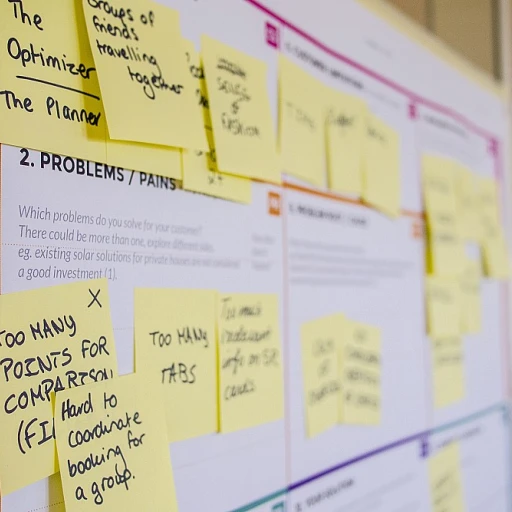The evolution of SEO: from manual to AI-driven optimization
From basics to artificial intelligence: the transformation of SEO
SEO, once a realm of manual tweaking and keyword stuffing, has evolved dramatically with the advent of AI technology. Industry reports indicate that over 70% of marketers believe AI is a critical element in their data strategy (Salesforce, State of Marketing report). As search engines get smarter, traditional SEO techniques have given way to more sophisticated methods.
Experts like Neil Patel and Rand Fishkin have highlighted the growing significance of AI in SEO, emphasizing the need for data-driven decision-making. In publications such as 'The Art of SEO' by Eric Enge, Stephan Spencer, and others, the potential of AI to analyze large datasets and uncover patterns for better search engine visibility is discussed.
Case studies from companies like Market Brew show how AI-powered SEO software can predict search engine rankings with a high degree of accuracy. And with tools like Google Analytics and AI-based alternatives gaining momentum, website performance tracking has never been more comprehensive.
However, it's not just about analytics. The creative aspect of SEO has also undergone a transformation. Algorithms now prioritize high-quality, relevant content over keyword-dense pages. This shift demands a new breed of SEO tools that can understand the intricacies of human language, benefiting from developments in natural language processing (NLP) technologies.
With AI-driven optimization, businesses can now streamline their SEO strategies, achieving better rankings in a more efficient and effective manner. But how does this transition impact the various aspects of SEO, from keyword research to content creation? These are the themes we'll be exploring as we dissect the capabilities of today’s best AI SEO software.
How AI is rewriting the rules of keyword research and strategy
Revolutionizing keyword strategy with AI
As SEO professionals know, keyword research is foundational to any strategy aimed at improving search engine rankings. Traditionally, this process involved manual research, tedious analysis of search volume and competition, and often a bit of intuitive guesswork. However, with the advent of artificial intelligence, a new era for keyword strategy has emerged.
AI-powered tools like SEMRush and Surfer SEO now offer advanced algorithms that do more than just suggest keywords; they provide comprehensive competitor analysis and deeper insights into search intent. A study by Backlinko attributes a 52% bump in organic traffic to AI-guided keyword optimization, illustrating the technology's substantial influence on search engine rankings.
These AI-driven tools are designed to evaluate SEO content based on big data, assessing which terms are likely to generate more traffic and suggesting alternatives with higher potential for conversion. They often come with content creation platforms that help generate high quality content tailored to the intended audience. By leveraging natural language processing, these systems can predict which keywords will become more influential, ensuring that you’re always a step ahead.
The influence of artificial intelligence is also seen in its ability to analyze SERPs to understand better what Google deems relevant for a topic. This behavior aligns closely with Google's focus on user intent, a key component emphasized in their recent algorithm updates.
Furthermore, AI is particularly adept at unveiling patterns in keyword trends. Reports from Conductor indicate that businesses utilizing these tools have seen a 21% increase in visibility for new keywords within just three months of implementation. This underscores the potential of AI to streamline the process of search optimization, making it more efficient and effective.
A particularly compelling case is presented by HubSpot, which leverages AI to refine their SEO strategy leading to a 35% increase in organic search visibility. They attribute this success to more accurately targeting long-tail keywords with the help of AI insights, allowing them to dominate niche search queries.
Adapting to semantic search nuances
The crossover of AI into SEO doesn't end with keyword selection. It extends to the understanding of the complexities of language through semantic search. AI has the remarkable ability to grasp semantic nuances, interpreting not just the words people type into search engines but the intent behind them.
Imagine wanting to rank for 'best seo tools'. AI can dissect the topic's context, suggesting related terms like 'seo strategy', 'seo content editor', or 'link building' that may also resonate with the searcher’s intentions. By feeding this information back into the optimization cycle, websites can become not just content-rich but contextually relevant – a critical factor in ranking well on search engines.
In heightening the sophistication of keyword research, AI is on the fast track to becoming an indispensable asset in SEO arsenals. It turns keyword research from guesswork into a science, leveraging massive data sets and machine learning to forecast keyword performance and advise on strategy. Its predictive capabilities, combined with human expertise, create an unmatched toolbox for those aiming to master the nuances of SEO optimization.
Discover the full potential of AI-enhanced keyword research in our exploration of intelligent search analytics.Content creation meet AI: the rise of intelligent writing assistants
Intelligent writing assistants: revolutionizing content creation
Remember the days when crafting SEO content was a guessing game? Those days are long over thanks to the innovative AI writing assistants that have emerged on the digital scene. By leveraging AI and voice search optimization, these tools are helping creators produce not just high-quality content but content that's optimized to rank higher in search engines.
Let's explore how AI is influencing SEO content creation. Today's content demands relevance and quality that resonates with both search algorithms and human readers. Advances in natural language processing (NLP) enable AI tools to analyze top-performing content across the web, providing insights into which topics, phrases, and structures are most likely to engage readers and climb the SERPs.
For instance, tools like Surfer SEO implement algorithms that assess over 500 ranking factors to suggest content improvements. Semrush, another powerhouse, offers an SEO writing assistant that integrates seamlessly with Google Docs, empowering writers to optimize as they draft.
One of the standout features of these AI-driven content tools is their ability to recognize keyword stuffing, a practice that search engines like Google have long condemned. These intelligent assistants suggest the optimal keyword density, taking out the guesswork and ensuring that your work adheres to SEO best practices.
The benefits extend beyond keyword optimization; some tools can suggest trusted sources, images, and even generate questions that your content should answer, effectively helping to address search intent—a key factor that Google's algorithms use to rank pages.
From a cost perspective, AI content tools offer scalable solutions. Whether you're working solo or part of a larger team, these AI-driven systems let you produce or refine your content for search engines faster than traditional methods. Though there's a cost associated with leading tools, the time saved and the value of ranking higher on search engine results pages (SERPs) often justify the investment.
To wrap it up, AI's role in content creation is both transformational and practical. It brings a data-driven approach to writing that merges the creative with the analytical, paving the way for content that attracts, engages, and retains audiences while satisfying the sophisticated appetites of modern search algorithms.
The key features of leading AI SEO tools: a detailed comparison
Analyzing Core Attributes of AI SEO Software
As the incorporation of artificial intelligence in search engine optimization continues to advance, a variety of cutting-edge software has emerged, setting new standards in the industry. These tools come packed with features that aim to simplify and enhance the SEO process. By evaluating the key functionalities that constitute the crux of these platforms, users can decipher which tool aligns best with their SEO needs.
Intelligent Keyword Analysis
AI-powered SEO applications like Surfer and SEMrush have revolutionized keyword research with their adaptive algorithms. The precision of data they provide, based on real-time search engine trends, allows for the identification of high-quality keywords tailored to boost search engine visibility. For instance, the best SEO software employs natural language processing (NLP) to interpret user intent, ensuring that the keywords are not only relevant but also have a higher probability of conversion.
Automated Content Optimization
With AI at the helm, content optimization is not just about density but relevance and context. Tools such as the SEO content editor in SEMrush or Surfer's content suite offer invaluable guidance on structuring content that resonates with both the audience and search engines. These platforms analyze top-performing content pieces and suggest optimizations that can improve ranking on SERPs, making the process vastly more efficient.
Enhanced Competitor Insights
Gaining an edge in SEO often involves detailed competitor analysis. AI-driven tools dissect competitors' online strategies, exposing weak points in their SEO armor. A deep dive into competitors' keyword strategies and content effectiveness helps businesses refine their approach. Surfer's SERP Analyzer and SEMrush’s Competitive Research toolkit exemplify features that dissect competitor data for actionable insights.
Monitoring Site Health and Performance
AI-driven SEO tools extend beyond content and competition. They also offer robust analytics to track website performance and identify technical issues. Features that measure site speed, analyze backlinks, and provide actionable reports are standard amongst top-tier tools. The diagnosis of such critical performance factors informs a holistic SEO strategy that aims for sustained growth.
Adapting to Personalized Search Trends
As personalization in search algorithms becomes increasingly prevalent, AI SEO tools are designed to tailor strategies that cater to individual user preferences. They stay abreast of changes in search engine algorithms, ensuring that SEO efforts are aligned with the latest search trends, such as voice search and mobile-first indexing.
Cost-effectiveness and Access to Periodic Updates
Given the dynamic nature of SEO, the best AI tools offer subscriptions that allow users continuous access to the latest features and updates. Pricing models such as that offered by SEMrush, where pricing starts at a monthly rate, give businesses the flexibility to choose a plan that balances features with the financial investment. Many tools also offer a free trial period, enabling businesses to gauge utility before committing to a full-fledged plan.
Final Thoughts on Tool Selection
Selecting the right AI SEO tool comes down to aligning business goals with the specific features that a software offers. Whether it’s for SMEs or large corporations, the extensive range of functions available can serve the diverse needs of businesses aiming for top search engine rankings. By leveraging the bespoke capabilities of AI, SEO is not only simplified but transformed into a scientific approach driven by data and innovation.
Quantifying success: measuring the impact of AI SEO software on website performance
Evaluating website performance with AI SEO software
With the advent of AI in SEO, software capabilities for tracking and improving website performance have evolved significantly. The best AI SEO software today not only enhances visibility on search engines but also provides in-depth analytics that can help businesses quantify their success in concrete terms. One meaningful way to assess the effectiveness of an AI-powered SEO tool is by examining the tangible improvements in a website's search engine rankings, organic traffic, and conversion rates.
When discussing enhancements in search engine rankings, it's essential to consider the accuracy and improvement of keyword positioning. A study from Backlinko revealed that the top Google search result has a 31.7% click-through rate, emphasizing the importance of ranking high. Companies using AI SEO tools have reported a noticeable climb in rankings due to smarter keyword optimization and more strategic content creation, supported by the sophisticated algorithms these tools employ.
In terms of organic traffic, AI SEO software meticulously analyzes search patterns and user behavior to tailor content that caters to the target audience. Pioneering tools in the market have demonstrated their ability to drive a significant influx of organic traffic. For example, an AI platform like Surfer SEO helps in optimizing content with the right keywords which can increase a website's organic visibility, resulting in more traffic. The use of AI in understanding user intent and predicting trends ahead of competitors becomes a game-changer here.
Conversion rates are another critical metric. A comprehensive report by SEMrush on AI and SEO highlighted that leveraging AI for on-page optimization can lead to a higher conversion rate. This is due to the software's ability to personalize content for different audience segments and optimize call-to-action elements for conversion.
While the performance metrics are clear indicators of success, it is also crucial to acknowledge the role of continuous learning and improvement that AI SEO software brings to the table. It constantly refines its understanding of SEO factors as search engine algorithms evolve, providing businesses with a long-term strategy for success. The most effective AI SEO tools incorporate natural language processing (NLP) and machine learning to adapt to the changes in how content is indexed and ranked by search engines, ensuring sustainable improvement in website performance.
Overall, AI SEO software has redefined the process of monitoring and optimizing website performance. It has set new benchmarks in ranking enhancements, organic traffic growth, and conversion optimization, equipping businesses with powerful insights and automated capabilities to thrive in the search landscape.
Balancing the scales: AI-driven content vs. human touch in SEO
Human creativity and AI precision in content optimization
In the modern SEO era, we are witnessing an intriguing blend of human creativity and AI's analytical prowess. While AI-driven tools bring efficiency, speed, and data analysis to the table, human intuition and emotional intelligence still play a pivotal role in crafting content that resonates with readers. Experts in the field, such as Neil Patel, emphasize the importance of maintaining this balance to ensure that content not only ranks well but also engages and converts.
Case studies: when AI complements the human SEO touch
Real-world case studies demonstrate the synergy between AI capabilities and human insight. For instance, CanIRank provides AI-powered SEO strategies that are then implemented and fine-tuned by human marketers, leading to increased traffic and engagement. Moreover, a report by SEMrush corroborates that the fusion of AI insights with a content writer’s expertise can elevate the content's alignment with search intents, thereby improving organic search visibility.
Expert analysis on the AI-human collaboration in SEO
Notably, Dr. Pete Meyers from Moz explains that while AI can immensely help with technical SEO tasks like site audits and keyword research, nuanced tasks such as understanding audience sentiment still require a human element. In his book, 'SEO for Growth', John Jantsch also delays the significance of human empathy in creating authentic connections through content. These insights suggest that while AI offers a significant competitive advantage, it doesn’t replace the need for human creativity and empathy in content creation.
Reconciling AI efficiency with authentic storytelling
The intrinsic value of human touch in SEO is echoed by content marketing professionals who highlight the importance of storytelling. AI software, while adept at optimization and pattern recognition, doesn't yet possess the innate abilities for authentic storytelling. Content that tells a story, evokes emotions, and connects with the reader on a personal level is still best crafted with a human touch. Therefore, while AI excels at crunching numbers and identifying patterns, it’s the storyteller who weaves these elements into a narrative that captivates the audience.
Controversy around AI-generated content and its SEO impact
The conversation isn't without its controversies. Recent debates center around Google’s perspective on AI-generated content. Google’s John Mueller has suggested that content generated through automated processes, including AI, might not always align with Google’s Webmaster Guidelines if it lacks the intention to help users. The SEO community continues to explore this area, pushing for greater clarity on how best to integrate AI approaches while adhering to SEO best practices.
SEO on a budget: evaluating the price-performance ratio of free and paid AI SEO tools
Weighing cost against capabilities in AI SEO solutions
When it comes to optimizing your website's search engine performance, the tools you choose can make a noticeable difference. With the advancement of AI in SEO, a question often arises: should you go for free tools, or does investing in paid software lead to better returns? Let's analyze the price-performance ratio of both to provide clarity.
Scoping out the free SEO tools landscape
Free SEO tools can be incredibly useful, especially for beginners or those with a constrained marketing budget. Some popular free options include Google Analytics and Google Search Console, which offer insights into website traffic and performance directly from the search engine giant. Natural Language Processing (NLP) based tools like Diib provide snapshots of website health and areas for improvement without eating into your budget.
However, free tools usually have limitations in scope, frequency of use, and depth of analysis. This can mean spending more time piecing together information from multiple sources, potentially delaying decision-making and action.
Navigating the vast sea of paid AI SEO platforms
Paid AI SEO tools like Surfer SEO, SEMrush, or the best SEO software identified through meticulous research often come with a cost that reflects their comprehensive features. These platforms provide a one-stop-shop for needs ranging from keyword and content optimization to competitor analysis and link building. The rich data and automation capabilities they offer can save time and help refine your content strategy effectively.
Investing in a paid tool might seem steep at first glance, with pricing often starting at a monthly fee that can be a hurdle for smaller enterprises. Yet, the manifold features and potentially higher search engine rankings they can facilitate may considerably increase website traffic and revenue, justifying the initial investment.
Deciding on the best fit for your SEO endeavors
Finding the perfect mix of price and features requires a clear understanding of your SEO needs and financial constraints. Businesses that rely heavily on their online presence might find the analytics, reporting, and time-saving automation of paid tools to be invaluable. In contrast, those just starting out or with tighter budgets may leverage free tools to get on the right path, building towards a paid option as their business grows. A thorough vetting process, often involving a day free trial provided by many paid options, can help ensure that your chosen tool aligns with your long-term SEO strategy.
Ultimately, understanding the strengths and limitations of free vs. paid AI SEO tools is essential for making the right choice without overspending. A solid SEO foundation can be built with free tools, but for truly competitive and scalable results, the advanced capabilities of paid tools often prove to be a worthy investment.
Embracing the future: what's next for AI in search engine optimization
What tomorrow holds for AI and SEO synergy
The digital marketing world is ever--adapting, and search engine optimization is no stranger to change. As artificial intelligence continues to evolve, it's poised to transform SEO in ways we're just beginning to grasp. Experts predict a movement towards even more personalized search experiences. For instance, artificial intelligence could power dynamic content creation that not only targets a keyword but also tailors content to individual user preferences and behaviors in real time.
The use of NLP (Natural Language Processing) in tools like Semrush and Surfer SEO indicates that search engines are prioritizing understanding searcher intent more intricately than ever. This shift is not about keyword stuffing but rather creating a natural, engaging conversation with users. AI helps by analyzing vast amounts of data to discern what content will perform best for given search queries, a far cry from the manual keyword research tools of yesteryear.
Link building, too, will witness a revolution. AI can identify opportunities for high-quality backlinks by studying patterns and predicting sites that are likely to link to certain types of content. This precision, coupled with faster content analysis, will save time and improve the efficacy of SEO strategies.
AI's impact on SEO isn't just about the tools; it's also about the people using them. Training and adaptability will become key as professionals need not only understand how to use AI-powered tools but also how to interpret their data effectively. Reports and analytics generated by AI will provide deeper insights into website performance, leading to more informed decisions and successful strategies.
Conversations around ethics and AI in SEO are also heating up. AI's capabilities raise valid concerns about the authenticity and quality of content. As Google continues to refine its algorithms to reward genuine, high-quality content, SEO professionals will need to strike the perfect balance between leveraging AI and maintaining a human touch within their content creation processes.
As for small businesses and individuals, the democratization of AI SEO tools could level the playing field, allowing them to compete with larger corporations. With a variety of tools offering day free trials and affordable pricing plans, powerful SEO strategies are becoming more accessible.
Certainly, the future is bright and brimming with potential for AI in SEO. With the right approach, tools, and understanding of both data analytics and human behavior, marketers can look forward to crafting winning strategies that shoot them up the search engine rankings.













